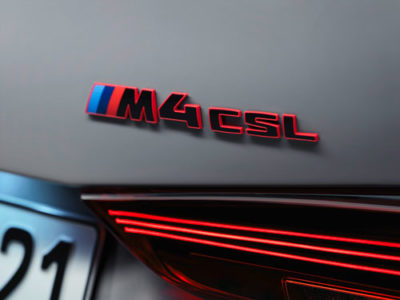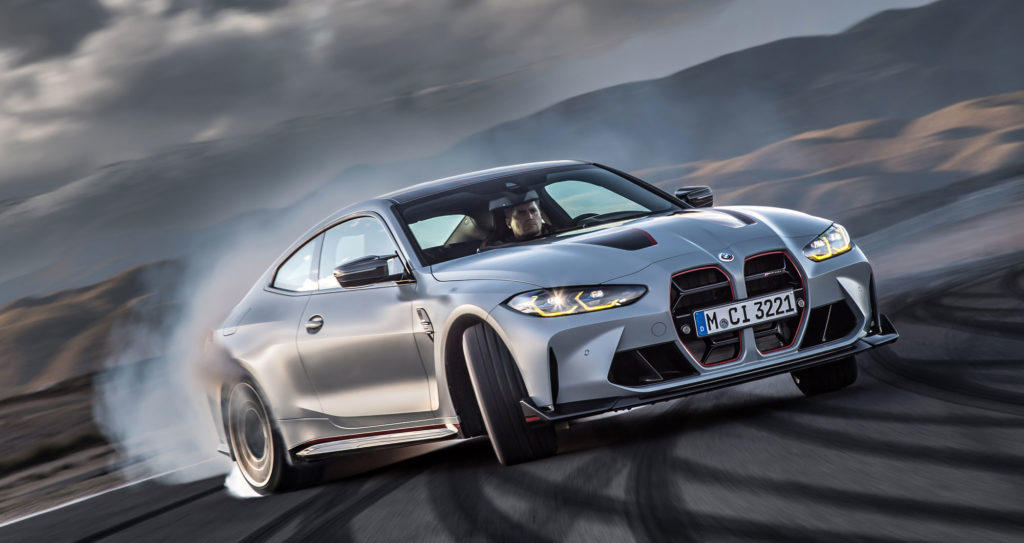
Thought your BMW M4 Competition was the top? Well the BMW M4 CSL has 40 more horsepower but weighs 240 pounds less. Those engineering achievements have created a performance machine with 543 hp and a curb weight of 3,640 lbs, giving it a power-to-weight ratio of 6.7 lbs/hp. It goes from 0 to 60 MPH in 3.67 and has to be electronically limited to 191 mph, lest it embarrass lesser machines.
Think that’s more hype? In test runs on the Nürburgring’s Nordschleife circuit, the M4 CSL achieved a lap time of 7:20.2, the fastest time ever for a production-series BMW. In other words, the new “Competition, Sport, Lightweight” BMW M4 embodies the closest thing you can buy to the actual BMW M4 GT3 race car.
And how did BMW engineers achieve the enviable balance that is CSL? Carbon fiber, of course. More specifically, Carbon fiber reinforced plastic (CFRP). Conventional components were replaced with lightweight versions. Seats, roof, hood, trunk lid, center console and more were switched out for CFRP versions. Light alloy wheels, springs, and struts, lighter sound insulation, titanium rear silencer, and other changes all combined to reduce the curb weight.
But Not Light on Power
The M4 CSL sports a modified six-cylinder inline engine with an eight-speed M Steptronic transmission powering the rear-wheel drive. BMW calls it the “most powerful road-legal M4 variant ever made.” With a maximum output of 543 hp at 6,250 rpm, the vehicle shows a near instantaneous response to the accelerator and continues to deliver power even in the upper limits of the rev range.
The chassis also received considerable attention, with weight, rigidity, and precision changes helping the car burn through dynamic limits. M-specification axles with a double-joint spring strut in front and a five-link in back were designed specifically for high-performance sports cars like this one. Even finer adjustments were made for ride-height, wheel camber settings, dampers, and more.
M Traction Control has the integrated braking system utilizing Dynamic Stability Control (DSC) to adjust for different surface types with precision. And that precision, along with most things driving-oriented, can be set by the person in the cockpit. The driver can set individual intervention thresholds for wheel slip limitation with ten different stages, or completely turn the DSC system off. The first five settings control how the car responds to wheel slip, but settings six through ten are specifically for track conditions. Six through ten let the driver make allowances for track surface conditions and tire temperature, optimizing traction and decreasing lap times.
So yes. It’s designed for the track.
But can it also be a daily driver? The interior sports a full array of BMW amenities, including iDrive and a COMFORT driving mode that lets the M4 CSL relax a bit. Sure, it doesn’t have an actual backseat. But the M4 CSL does have a handy net to hold helmets. You can probably fit groceries back there if you are really limber.
So behold, the BMW M4 CSL. Probably coming soon to a BMW CCA Club Race near you.
| BMW M4 CSL Specifications | |
| Body | |
| No. of doors/seats | 2 / 2 |
| Length / Width / Height (in) | 188.7 / 75.6 / 54.6 |
| Wheelbase (in) | 112.5 |
| Track, front / rear (in) | 63.9 / 63.3 |
| Ground clearance (in) | 4.4 |
| Turning circle (ft) | 40.0 |
| Fuel tank capacity (gal) | 15.6 |
| Engine oil capacity (qts) | 7.4 |
| Curb weight (lbs) | 3,640 |
| GVWR (lbs) | 4,343 |
| Luggage capacity (cu ft) | 12 |
| Engine | |
| Config. / no. cylinders / valves | Inline / 6 / 24 |
| Engine technology | M TwinPower Turbo technology with two mono-scroll turbochargers, indirect charge air cooling, high precision injection, VALVETRONIC fully variable valve control and Double-VANOS variable camshaft timing |
| Capacity (cc) | 2,993 |
| Stroke / bore (mm) | 90.0 / 84.0 |
| Compression ratio (:1) | 9.3 |
| Max output (hp @ rpm) | 543 @ 6,250 |
| Max torque (lb-ft @ rpm) | 479 @ 2,750-5,950 |
| Driving Dynamics and Safety | |
| Suspension, front | Adaptive M suspension with double-joint spring strut axle in lightweight aluminum construction, M-specific kinematics and elastokinematics |
| Suspension, rear | Adaptive M suspension with five-link axle in lightweight aluminum / steel construction, rear-axle subframe with rigid bolted connection to the body, M-specific
elastokinematics |
| Brakes, front | 15.7-in M Carbon ceramic brakes, vented, with six-piston
fixed calipers |
| Brakes, rear | 15.0-in M Carbon ceramic brakes, vented, with single- piston floating calipers |
| Driving stability systems | DSC including ABS, ASC, and M Dynamic Mode (MDM), can be switched off, integrated wheel slip limitation, CBC (Cornering Brake Control), DBC (Dynamic Brake Control), Dry Braking function, Start-Off Assistant, Active M
Differential |
| Safety equipment | Airbags for driver and passenger, side airbags for driver and passenger, head airbags, three-point inertia reel seatbelts, belt tensioner and belt force limiter, crash sensors, tire pressure indicator |
| Steering | Electric Power Steering (EPS) with M-specific Servotronic |
| function and variable sport ratio | |||
| Steering ratio overall (:1) | 15.0 | ||
| Tires front / rear | 275/35ZR 19 100Y XL / 285/30ZR 20 99Y XL | ||
| Rims, front / rear (in) | 9.5J x 19 forged light alloy / 10.5J x 20 forged light alloy | ||
| Transmission | |||
| Type | 8-speed M Steptronic transmission with Drivelogic | ||
| Gear ratios | I | :1 | 5.000 |
| II | :1 | 3.200 | |
| III | :1 | 2.143 | |
| IV | :1 | 1.720 | |
| V | :1 | 1.313 | |
| VI | :1 | 1.000 | |
| VII | :1 | 0.823 | |
| VIII | :1 | 0.640 | |
| R | :1 | 3.478 | |
| Final Drive | :1 | 3.154 | |
| Performance | |||
| Power to weight (lbs/hp) | 6.7 | ||
| Output per liter (hp) | 181 | ||
| Acceleration 0-60 mph (sec) | 3.6 | ||
| Top Speed (mph) | 191 | ||
